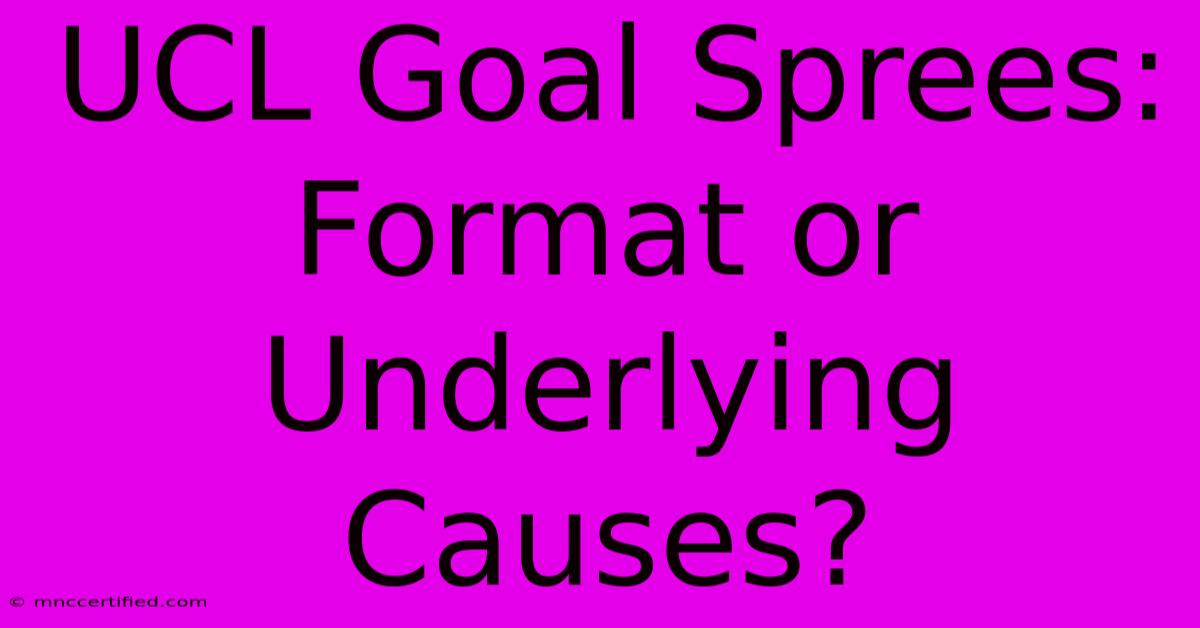UCL Goal Sprees: Format Or Underlying Causes?

Table of Contents
UCL Goal Sprees: Format or Underlying Causes?
The UEFA Champions League (UCL) is renowned for its thrilling matches, but some games transcend the usual excitement, erupting into goal-scoring extravaganzas. These "goal sprees," where teams rack up multiple goals, have become a captivating aspect of the competition. But what truly fuels these high-scoring encounters? Is it a consequence of the tournament format itself, or are there deeper, underlying causes at play? This article delves into the possible explanations behind UCL goal sprees.
The Tournament Format: A Contributing Factor?
The UCL's format undoubtedly plays a role. The knockout stage, particularly the latter rounds, introduces a heightened sense of urgency. Teams facing elimination often adopt more attacking strategies, leading to open games with increased goal-scoring opportunities. The pressure to score, coupled with the risk of early exits, can result in higher-scoring matches than seen in the group stage.
Emphasis on Attacking Football:
The overall prestige and competitiveness of the UCL incentivize teams to prioritize attacking football. The best teams in Europe are participating, and a more cautious approach can quickly lead to elimination. This focus on attack naturally contributes to higher goal tallies in certain matches.
Home Advantage & Away Goals:
Historically, the away goals rule (now abolished) significantly impacted tactics. Teams playing away often had to attack more aggressively to secure a vital away goal, increasing the likelihood of higher-scoring affairs. While the rule is gone, the inherent pressure of playing away in a crucial UCL tie still exists.
Underlying Causes: Beyond the Format
However, the UCL's format is only part of the equation. Several other factors contribute to these goal sprees:
Tactical Approaches:
- High Pressing & Gegenpressing: Modern tactical trends, such as high pressing and gegenpressing, can lead to fast-paced, end-to-end games, creating numerous scoring chances. This style, favored by many top teams, often prioritizes winning the ball back high up the pitch, leading to rapid transitions and goals.
- Weaknesses in Defensive Structures: A team's defensive vulnerabilities are often cruelly exposed in the UCL's high-stakes environment. If a team's defense cracks under pressure, it can easily lead to a flood of goals for the opposing side.
- Individual Brilliance: The presence of world-class attacking players on many UCL teams significantly increases the potential for goal sprees. A single moment of brilliance from a Lionel Messi, Cristiano Ronaldo, or Erling Haaland can quickly shift the momentum and lead to multiple goals.
Match Circumstances & Mentality:
- Early Goals: An early goal can dramatically alter the flow of a match. A team conceding early might feel compelled to chase the game, leading to a more open contest and potentially more goals.
- Momentum Shifts: The psychological aspect of football can't be ignored. A team scoring a couple of goals quickly can build unstoppable momentum, while the opposing team may lose confidence and concede further goals.
- Refereeing Decisions: While controversial, refereeing decisions can influence the game's flow and affect the final scoreline, sometimes contributing to higher goal counts.
Conclusion: A Complex Interplay
In conclusion, UCL goal sprees aren't simply a product of the tournament's format. While the knockout stage and the inherent pressure do contribute, the underlying causes are more complex. Tactical approaches, individual brilliance, match circumstances, and even refereeing decisions all play a role in creating these exciting, high-scoring encounters. Understanding this intricate interplay gives a more nuanced perspective on why some UCL matches turn into unforgettable goal-scoring feasts. It's a combination of format and circumstance, a perfect storm of attacking prowess and defensive vulnerabilities creating spectacles that define the Champions League.

Thank you for visiting our website wich cover about UCL Goal Sprees: Format Or Underlying Causes?. We hope the information provided has been useful to you. Feel free to contact us if you have any questions or need further assistance. See you next time and dont miss to bookmark.
Featured Posts
-
Honda Grom Insurance Cost
Dec 10, 2024
-
Ariel Atom Insurance Cost
Dec 10, 2024
-
Joseph E Hansen Insurance
Dec 10, 2024
-
Car Insurance Manassas Va
Dec 10, 2024
-
Open Ai Sora Release Whats New
Dec 10, 2024